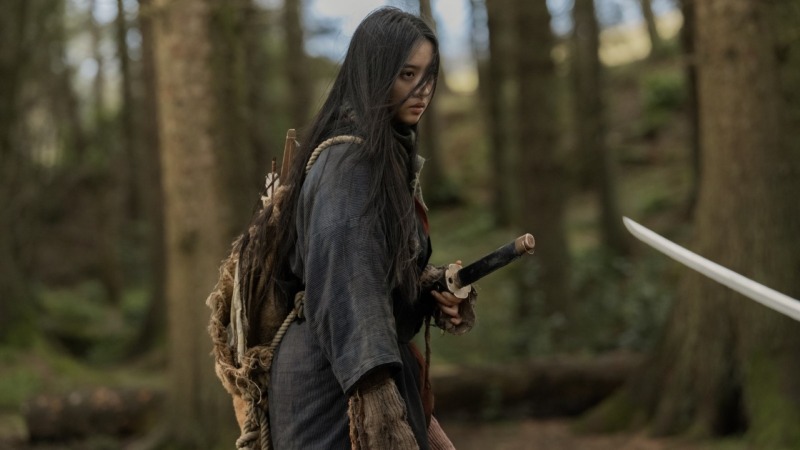Tornado Is an Attractive Thriller That Reaches Too Hard for Genre Cred
Photos courtesy Shudder
It’s interesting how a filmmaking choice that imbues a movie with instantly gripping tension can also, simultaneously burden the same film with unfortunate baggage later on. Such is the case with Scottish director John Maclean’s attractively made but haphazardly structured and paced Tornado, his sophomore film coming a decade after the similarly lustrous, well-received revisionist western Slow West. This new, Scottish-set blend of western and samurai cinema influences seems to desire, in its bones, to be a dire, grounded, struggle-for-survival thriller with themes revolving around the influence of fatherhood and the fallout of impulsivity and greed, but it’s arguably led astray by an imperative to swing in the direction of pulpier (and sellable) revenge story, backloading its genre goods so deeply that when they finally arrive late in the game, they derail the more contemplative mood that has been established. Tornado is left stranded between tones, set adrift without a rudder.
Despite that, it’s frequently transfixing, never more so than in its earliest moments. Tornado begins in media res, with a teenage Japanese girl stumbling and desperately trying to maintain her footing as she flees across clumps of Scottish heath. The year is 1790. Behind her, a group of adult men in dark grays and black–bandits of a kind, it would seem–plod solemnly after her. They don’t run; they don’t seem to need to. They know there’s no place for their quarry to hide for long. It’s a thrillingly direct, largely wordless intro to get the audience invested in a pursuit that clearly has life-or-death consequences. When the girl takes refuge, hiding within a plush country estate mansion, we can see that the other residents are about to be in supreme danger as a result of the unknown fugitive who is suddenly amid their ranks.
The girl in question, we come to learn later, is Tornado (Japanese actress Kōki), who along with her supposedly ex-samurai father Fujin (Takehiro Hira of Shogun) operates a traveling puppet show theater in the Scottish countryside, living off the alms of local farmers even as her father trains her in samurai code and the way of the blade in an endless, Lone Wolf and Cub-esque journey. How did they come to be here, living this nomadic entertainers’ existence in the Georgian era U.K.? We’re never afforded even a whiff of a hint, although perhaps we can surmise that there’s an autobiographical element to their samurai puppet show, filled with betrayal, murder and revenge. Regardless, Tornado has grown into a restless young woman, chafing against the strict protectionism of her wary father, yearning to take a few independent steps into a dangerous world where she can’t help but be seen as an Other. And that’s when opportunity (and deadly consequence) falls into her lap.
Tornado’s MacGuffin is a classic one: A few weighty bags of gold recently acquired by the gang led by Sugarman (Tim Roth, weary but commanding) and his ambitious, scheming son Little Sugar (Jack Lowden). Foolishly unattended as the gang rests among the audience of Tornado and Fujin’s puppet performance, the bags of gold are quickly scooped up by the nearest opportunist, which is not initially Tornado. But as the keen crowd observer takes in what is happening, Tornado hatches her own little delusion of grandeur, and is faced with a moment of impulsivity and critical choice: Intercept the gold, or continue on with a nomadic existence that may last for the rest of her life. Of course, attempting to insert herself in the gang’s business–without her father’s awareness–may well have just drastically shortened said lifespan.
These are all details that are drip-fed to us via an extended flashback sequence in the film’s center, which unfortunately has the effect of taking the early propulsiveness of Tornado’s first 20 minutes or so and bringing them to a screeching halt. One can understand why Maclean was keen on immediately dropping his audience into the most suspenseful sequence of his screenplay, but the choice to embrace the nonlinear narrative ultimately isn’t particularly well justified–our flashback to the instigating events of the story mostly contains material that we would have already inferred, and few additional layers of meaning to anything we’ve already seen. The primary function of the flashback is to ground us in the relationship between Fujin and Tornado, to add stakes to the parental death we more or less already know is coming–a loss that would probably feel more visceral if we experienced it playing in order, rather than having it spelled out for us in advance. Maclean’s narrative isn’t very well served by electing to chop up its natural build.
-

-

-

-

-

-

-

-

-

-

-

-

-

-

-

-

-

-

-

-

-

-

-

-

-

-

-

-

-

-

-

-

-

-

-

-

-

-

-

-








































